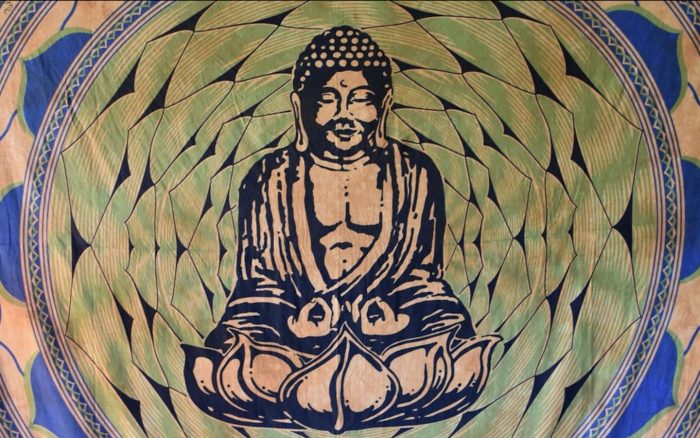Lucky you! This is the first part of a series; more to come on this topic.
There has been one constant in my life: I’m an intensely religious and spiritual person.
As a child and teen, my faith pulled me through periods of isolation, emotional trauma, and codependency. (I’ve been a student of Buddhism since my early 20s but was raised Catholic.)
So, when I approach the Buddhist assertion of no-God, I do so carefully and respectfully. I must, because the religious experiences I had when I was Catholic were valid for me at the time—they helped me. For this reason, and because many of us here in the West come from monotheistic traditions, I felt the need to address this viewpoint of God and No-God first.
Buddhadharma has a long history and tradition of logic and debate. The Buddha himself spent years studying under India’s foremost ascetics and philosophers, and his teachings reflect that. When forming his ultimate view, he analyzed, contemplated, and meditated on what many other spiritual masters believed were ultimate truths—aspects of our existence no one could deny.
And from his first teaching with the Four Noble Truths, he added a powerful worldview that utterly destroys present and future suffering. To do so, he added to some philosophies, tweaked others, and refuted more. He brought in new ideas and denied the logic and possibility of others. One of the ideas he denied was the existence of a creator-god.
Now, I’m pausing here because I think we need to hold that thought and look at the language. He didn’t deny the existence of gods in general. He didn’t say that those practicing faiths in which they pray to and believe in God were praying to nothing at all. He simply said, “Look, the way you define your God…it’s not logical. Such a being cannot exist in this reality.”
What does this mean?
Does it mean that when I was a child praying—finding a connection to a deep, penetrating universal love that went beyond the world and its limitations—that it didn’t exist? No, not at all. It exists. I felt it.
Does it mean that this universal love I felt is not a being offering a personal connection to something larger? No. That connection was real.
Does it mean that this personal connection to a greater, universal love is somehow faulty and will lead me astray? Nope. The truth and goodness of that experience was beneficial, not false. All it means—really—is that this universal love, this great personal connection to peace and greatness, didn’t create your reality. You did. That’s all.
So, what is this undeniable logic that refutes the existence of a creator-god?
I’ll tell you.
Take an ordinary object in our world—let’s say it’s a table. This table exists. We see it; we can touch it; we can put our coffee on it.
Yes, it functions. But it hasn’t always been there. To be the table that exists now, it needed to be made by a table maker. It’s wood planks that came from a tree, which grew from a seed, which came from parent trees, and so on.
You can trace it all the way back to the origin of vascular plants, the origin of DNA, the origin of the solar system, the origin of the universe, the great emptiness between universes, the ending of the previous universe, and to beginningless time—ad infinitum.
All objects in our universe exist this way. Just pick one and analyze it.
In a universe where everything is created dependent on causes and conditions, someone posited a creator for it. A being who does not change (and thus, would not have thoughts, which, by definition, changes on a momentary basis). A being who has no causes in and of itself (and thus could not perform a function).
A being who is permanent like some kind of ultra-permanent diamond, yet somehow creates you, the universe, and everything.
It doesn’t make a lick of sense. We’re talking two opposites here: one is static where objects have no causes, no change, and thus no ability to move, think, function, or even—heck—come into existence or die. And another in which everything that we live with in our actual universe, in reality, is just the way it is.
That universal love, that greater being, that personal connection to the infinite is not diminished by the Buddha’s assertion in a lack of a creator. It isn’t about cynicism or the absence of divinity.
It simply shifts things, once again, into a larger, more realistic picture of who we are, what we need to do, and who is available to help us on that journey.


 Share on bsky
Share on bsky





Read 3 comments and reply